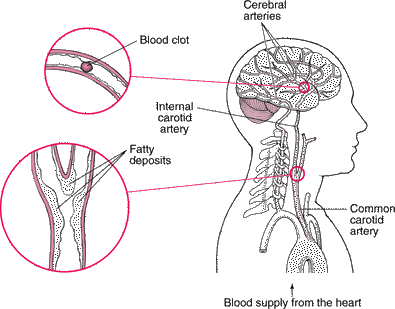Acute Ischemic Stroke
What is an Ischemic Stroke?
A stroke happens when the blood supply to part of the brain is cut off because atherosclerosis or a blood clot has blocked a blood vessel.
Blood clots can travel to the brain from another artery (artery-to-artery embolization) or they can come from the heart (cardioemblic stroke).
Loss of blood to the brain can be due to many reasons, here are a few:
- Development of an athermoa (fatty material) along the walls of an artery, causing a reduction of blood flow. The atheroma can then break off from the artery's wall and dislodge in a smaller artery causing a blockage.
- Sometimes, blood clots can also form in the heart and break loose from one of the heart valves. This is known as an embolus and it can travel to the brain causing blockage in on of the blood vessels supplying blood to a part of the brain. Patient's with atrial fibrillation are at an increased risk of this type of stroke (known as an embolic stroke) since they are more likely to have clots in the heart.
- Certain infections or inflammation can cause narrowing in the brain vessels causing a vasculitis.
- Certain drugs like cocaine and amphetamines can also result in blood vessel narrowing.
- If your blood pressure drops too quickly, this can decrease blood suppply to the brain and lead to a stroke if the pressure remains low for a long time.
What are the symptoms of an ischemic stroke?
- Changes in sensations in an arm, leg or one side of the body
- Sudden weakness in the arm or leg on one side of the body and the body
- Loss of vision or hearing changes
- Dizziness
- Double vision
- Trouble walking straight
- Slurred speech
- Trouble thinking properly and difficulty with words
- Not recognizing parts of your own body
- Loss of balance and falling
What are the treatments available?
- Intravenous tPA
- Penumbra
- Intra-Arterial tPA
- Carotid Angioplasty and Stenting
- MERCI Device
- Brain Vessel Stenting
Disclaimer: The content of this website is produced and made available for informational and educational purposes only and does not constitute, and should not be used as a substitute for, medical advice, diagnosis, or treatment. Patients and other members of the general public should always seek the advice of a physician or other qualified healthcare professional regarding personal health or medical conditions.

